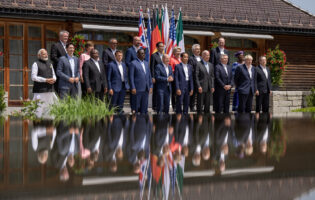A German-American Dialogue of the Next Generation
The eight participants of the Foreign & Domestic Policy group came together for their first virtual meeting on September 7, 2016. The aim of the meeting was to lay out the areas of focus, identify potential conflicts for the transatlantic relationship, and to find solutions to address the issues of concern.
The group focused on the following key areas:
- Rebalancing the relationship.
Evaluating the status quo, it became clear that a rebalancing of the current relationship is needed before dealing with concrete policy recommendations for the German-American partnership. In this context, one should consider how the countries need each other and how the relationship might be changing in the upcoming years. Both sides are preoccupied with domestic affairs at the moment and the focus is not on the transatlantic relationship. The rise of populism, anti-globalization, isolationism, and nationalism are increasing trends in both countries and threaten the democratic fabric. To establish a successful rebalanced relationship, it is essential to analyze the expectations of each other, and indeed the parameters of relevance shared between the two countries, in order to successfully partner in dealing with both opportunities and conflicts. While some say the era of transatlanticists is over, others argue that it is resurgent. Who is correct will largely depend on how the relationship is rebalanced in terms of interests, goals, and strategies to achieve them. Many determinants of the relationship have changed significantly, especially since German unification and the end of the Cold War. Yet when the discussion turns to rebalancing, the question is what are and will be the combinations of interests, values, decision-making processes, and goals with which we define the relationship between Germany and the United States in the twenty-first century?
- Rebuilding trust.
The relationship between the United States and Germany was defined for most of the period following World War II by the Cold War framework, in which the two German states formed the front line of the East-West conflict. For the United States, Germany was the object of its foreign policy. West Germans were dependent on the United States for security and stability for four decades. Following unification, Germany has been increasingly seen as the subject of U.S. foreign policy—a partner with which the United States wishes to tackle other challenges in the post-Cold War period. But adjusting to the respective views of itself and roles as well as responsibilities has been hard on both sides of this partnership. The U.S. has always seen itself as a global leader and player with strategic interests and reach everywhere. Germany has seen itself as a regional leader in Europe with primarily global economic interests. There has been shared engagement in international networks and institutions. Yet the view and behavior of the United States has occasionally caused tensions and conflicts with Germany in some areas. That was visible in earlier years in differences over the global engagement of the United States in Vietnam or later in Iraq. The image of the United States suffered severely after the NSA affair became public in Germany, during which the asymmetry of strategy and tactics became visible. Even though the political leadership has managed to get over a lack of trust to a large extent, German society at large still harbors a long-lasting mistrust of some American policies. Indeed the all-pervasive presence of the United States in Germany has always generated platforms of friction and resentment. Yet while the policy communities are closely engaged with each other and the webs of economic and business interests are extensive, there has been some transformation in the societal realm reflecting a change in the relevance of the two countries perceived in the larger public.
- Deepening the transatlantic relationship by understanding both differences and similarities.
An asymmetry between the two countries in terms of who pays more attention to the other has always been present. Germans are far more conscious about the transatlantic relationship, whereas Americans often strategically pick and choose bilateral partners in different issues and areas of the world or different purposes. The United States has other priorities where Germany can and does play a role: in China, with regard to Russia, and in the Middle East. But there are other areas where the United States is engaged with less relevance for Germany. The United States will always be ahead of Germany in terms of certain capacities, like defense spending and intelligence gathering or simply the global reach of a superpower. Yet the United States is also adjusting to the need for partnerships to rebalance its own responsibilities and resources. Meanwhile, Germany has become ever more immersed in a European framework of thinking and acting even as it has assumed more responsibilities and indeed leadership capacities. However, while the political leadership understands the importance of these changes, the general populace in Germany struggles with that challenge. Grasping how the respective national narratives are evolving is central to understanding what Germans and Americans share and what distinguishes them from each other.
- Transatlantic Security – Definitions and Strategies.
This area not only concerns the concrete bilateral cooperation between Germany and the United States, but also their engagement and collaboration within NATO and the EU. Ever since unification over a quarter century ago, Americans have expected Germany to take on more responsibility in its foreign policy. While the German leadership knows that it has to do more and the United States recognizes that Germany is indeed moving in that direction, it is necessary to determine how the parameters in Europe influence that process in order to understand how Germans see themselves, especially as Germany has become a cornerstone of security and prosperity in the EU even as the country remains uncomfortable with that role. This has become much more evident in the wake of Brexit. In addition to Germany assuming a leadership role, Europe is expected to become a more influential (and unified) player on the global stage. The challenge of getting a grip on the narratives on both sides of the Atlantic, which try to explain the transformations occurring within domestic debates as well as across the Atlantic, is a core necessity for all those engaged in the dialogue. Germany and the United States have been partners in leadership but they are also leaders in partnership and those equations are not free of friction even if they are also necessary for the benefit of both countries. The two countries are competitors, cooperative partners, and collaborators. There are multi-level networks in those relationships. The metrics of those connections are important to understand, especially when there are clashes as well as cooperation.
- Dealing with globalization.
Germany and the United States are major forces and factors on the global stage with different levels of resources and impact. They are strategic stakeholders in the global environment in multiple dimensions, the economic direction of this relationship, but also in the spheres of interest in the context of foreign policy. They share strategic views and objectives in multiple settings. They also share a complicated decision-making process within their respective national frameworks as well as in the international framework. Germany understands that more readily as a key member of the EU. Yet the challenges Germany and the United States face at home in forging a consensus on policy priorities and resources make it no easy task to expand that effort access the Atlantic. Getting our respective expectations of each other right while forging shared strategies where possible is part of the relationship. Given the fact that there are two important national elections occurring within about a year of each other, there is an opportunity to shed light on the respective debates and arguments about “quo vadis” questions. We may share debates over political trends, be they populism, isolationism, terrorism, or governance, but we may also come up with different narratives to explain our choices in dealing with each. The debate over TTIP stands as a reminder of such challenges. What can be done? Where are those areas of most promise in exploring the shared challenges and the relevance of pursuing them jointly? What are the most difficult? Do we have the best tools to tackle either?
Meeting report written by Simon Schütz.







